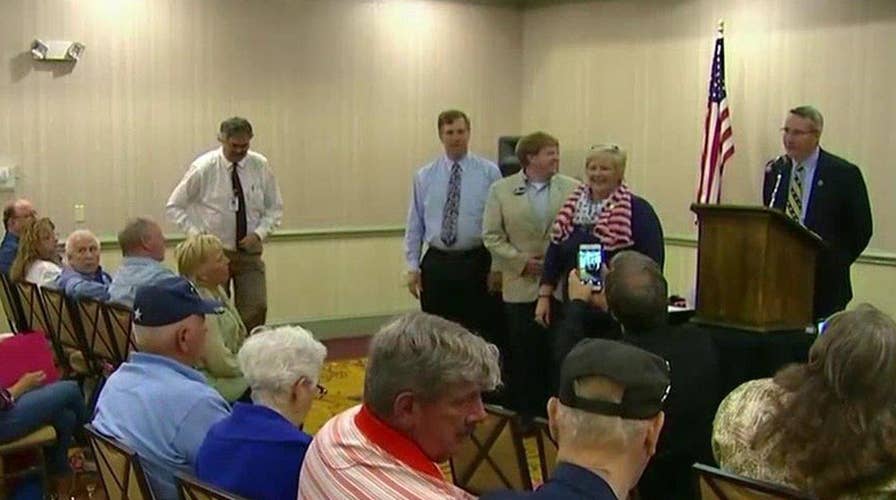Inside the behind the scenes battle for GOP delegates
Chief Washington correspondent James Rosen reports from Rock Hill, South Carolina
ROCK HILL, S.C. – “We may have had a dangling chad. We’re looking into it,” said Tommy Pope with a smile.
The tall, courtly lawyer, who serves as speaker pro tem of the South Carolina House of Representatives, was gamely trying to entertain a crowd of GOP activists while a few of them spent a full hour poring over paper ballots that 80 of them had just cast in a non-descript ballroom at the local Holiday Inn.
Welcome to the Republican Party convention for South Carolina’s fifth congressional district, where the main business of the evening was the election of three delegates to the party’s convention this summer.
GOP front-runner Donald Trump handily won the Palmetto State’s primary on Feb. 20, and in so doing swept all of its seven congressional districts. That means that all of South Carolina’s 50 delegates to the convention are bound to support the New York real estate mogul on the first ballot in Cleveland – but all of them become unbound on the second ballot.
This makes it crucial for the national campaigns to ensure that their supporters occupy the delegate slots that are filled in district conventions like this one. By evening’s end, it was clear that the majority share that Texas Sen. Ted Cruz has captured of these “district delegates” in South Carolina, despite losing the primary, was in no danger of being overturned.
The three top vote-getters were Steven Blanton, a finance director for a beef packing firm who cast his vote two months ago for Ohio Gov. John Kasich; Shery Smith, a bookkeeper for an assisted-living facility who served as a field director for Cruz; and Linda McCall, who, as the wife of a Republican National Committeeman, had chosen to remain uncommitted.
Blanton told Fox News he wouldn’t even vote for Kasich on a second ballot in Cleveland, however, because to do so would defy the will of the people as expressed in the Feb. 20 primary.
“We crossed a certain line the other night, when Trump swept those states,” said Blanton. “If you were talking about a delegate count where we’re even, and there were a tie issue at stake, yeah, I would probably want to do something for Kasich. But I think we’re out of those woods right now.”
Smith, of Sumter County, said she has been networking for five years to reach this point, and would absolutely vote for Cruz on a second ballot. Toward that end, she told Fox News she hopes the senator, now trailing Trump by more than 400 delegates, will stay in the race through the end of the primary process, in June.
“Senator Cruz is a very brilliant man, and he does have a long game plan. He adapts as the circumstances change,” she said. Her advice to him now: “Step it up a notch!”
Matt Moore, the chairman of the state Republican Party who has disagreed with some of Trump’s policy proposals, said the selection of delegates is a two-year process in the Palmetto State. “A number of Cruz supporters, frankly, were involved at this time last year,” Moore told Fox News. Asked if Trump carries a disadvantage in the delegate-selection process at the district level, Moore said: “The fact is he maybe started a little bit late in the process – but again, it’s a process, and it has to be respected.”
One of the mysteries of the cycle is how free an agent these delegates actually are once they become unbound. Some analysts say these local activists will defer to the wishes of party officers superior to them in rank, such as a district convention chair, a state party chair, or even a governor.
“They will be very cross-pressured,” agreed Karen Kedrowski, the political science professor who is the dean of Winthrop University’s College of Arts and Sciences. “They are going to be hearing from everybody in every direction about what they ought to do.”
But in an interview on the university’s picturesque campus a few hours ahead of the Holiday Inn balloting, Kedrowski suggested the unbound delegates will be motivated by something more fundamental than fear of consequences from party higher-ups.
“What they want is to win the White House. And so what they are going to be thinking about, first and foremost, is not ‘What do I have to answer for when I get home?’ but ‘Who is most likely to beat Hillary Clinton?’”
Fox News' Serafin Gomez contributed to this report.





